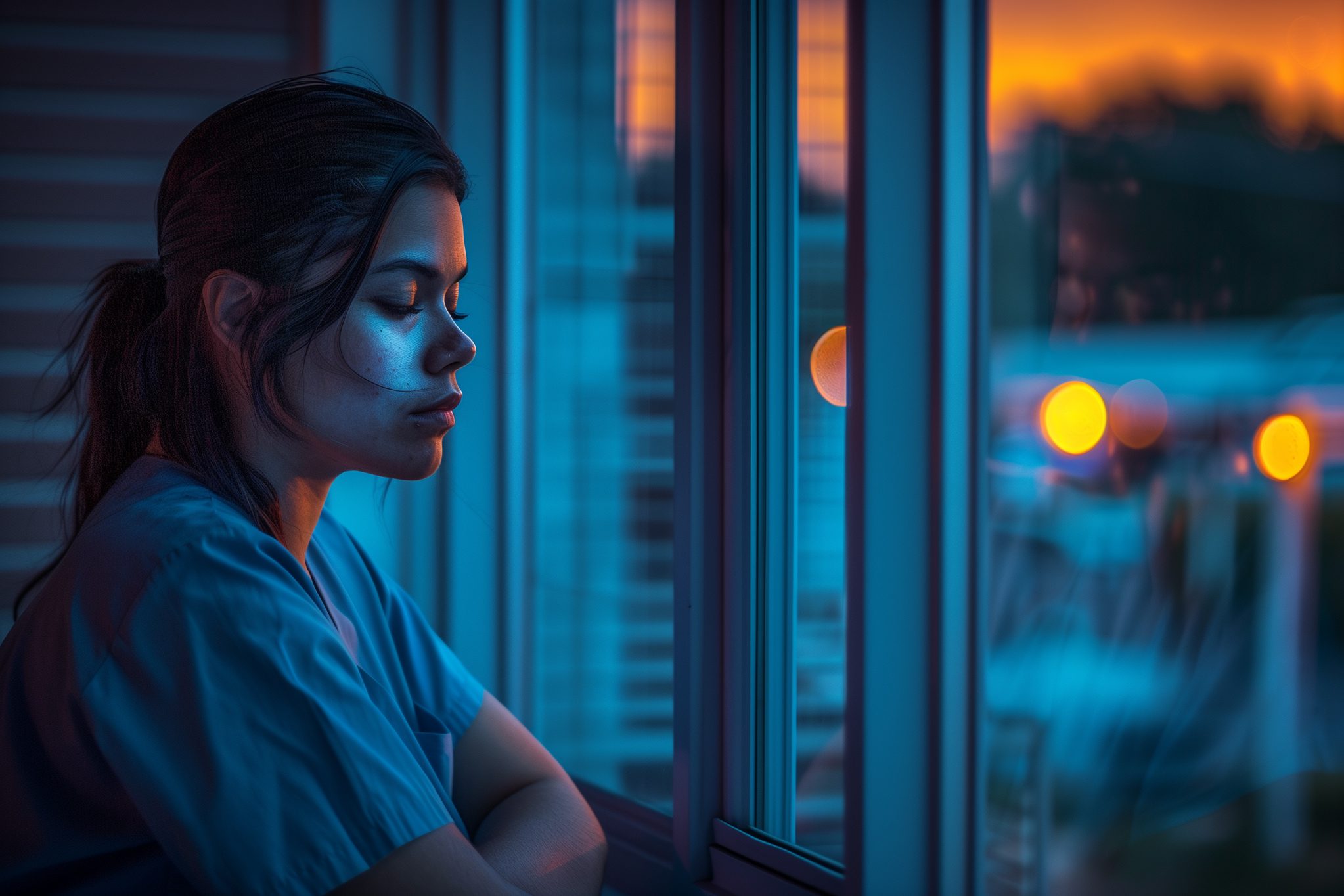
Understanding Shift Work Sleep Disorder (SWSD): Causes and Symptoms
Shift work sleep disorder is a common sleep disorder that affects shift workers. Find out what causes this disorder and what you can do to manage symptoms.

Shift work sleep disorder (SWSD) can occur when a person works irregular shifts or overnights. This disorder is common among police officers, firefighters, EMTs, cleaning crews, nurses, and others who work non-traditional shifts. Not everyone who works in these professions gets SWSD, but most shift workers are at risk. It is estimated that as many as 40 percent of people who work outside a traditional 9 to 5 schedule are affected by SWSD.
SWSD can cause a lot of problems for those who end up getting this sleep disorder. This disorder can make it very difficult to fall asleep. It can also cause unwanted sleepiness during the day and lead to automobile and other accidents.
Why Shift Work Affects Your Sleep
The main reason why shift work impacts your sleep is because it messes with your circadian rhythm, which is the body’s natural sleep-wake cycle. Sunlight triggers your internal clock and lets your body know that it’s time to wake up. Daylight stimulates the release of certain hormones, like cortisol, that help you wake up and go about your daily routine. Shift work throws off this process. Overnight workers are awake at night when the body’s natural tendency is to sleep. They are sleeping during the day when the body wants to be awake. This misalignment is what leads to a sleep disorder.
Symptoms of Shift Work Sleep Disorder
Sleep work sleep disorder is characterized by significant problems falling and staying asleep.
If you have SWSD, you may experience the following symptoms:
- Insomnia
- Waking up feeling tired or not refreshed
- Excessive daytime sleepiness
- Difficulty concentrating
- Lack of energy
- Headaches
- Irritability
- Depression, anxiety, and mood issues
Consequences for SWSD
Shift work sleep disorder can impact a person’s life in a variety of ways. This disorder can lead to:
- Increased risk of accidents
- Higher rates of absenteeism at work
- Poor work performance
- Impaired memory and concentration
- Alcohol and substance abuse
Sleepiness, one of the main symptoms of SWSD, can cause serious accidents and injuries at work. In fact, sleepiness is partially to blame for the Chernobyl Disaster, one of the world’s worst nuclear accidents.
SWSD can also affect one’s health. People who have SWSD are at an increased risk of a variety of health issues including:
- Insulin resistance
- Ulcers
- Heart disease
- Metabolic syndrome
- Colorectal cancer
How is Shift Work Sleep Disorder Diagnosed?
If you have the symptoms of SWSD and you work shifts outside a typical 9 to 5 schedule, then you will want to visit your doctor for a diagnosis. Your doctor will probably want to review your sleep patterns, so keeping track of your sleep will help. There are other sleep disorders that shift workers are prone to, including delayed sleep-wake phase disorder. So, a sleep study may be recommended to gather additional clinical data about your sleep. You may be referred to a sleep specialist for this.
Sleep Tips for Shift Workers
If you have to work irregular hours, try these sleep tips. These strategies can help lessen the symptoms of SWSD.
Use Blackout Curtains
If you have to sleep during the day, use blackout curtains or blinds to block the sun. Sunlight stimulates your circadian rhythm. So, if light is coming in through your window, it will keep you awake. Exposure to light also suppresses the production of the sleep hormone melatonin, which throws off your sleep.
Wear Sunglasses When Leaving Work
If you are getting off work during the day and plan to sleep, then put on a pair of sunglasses for the ride home. Not exposing your eyes to bright sunlight on the way home will help prevent your body from reacting to daylight cues. This will make it easier for you to fall asleep when you get home.
Maintain a Regular Sleep Schedule
Go to bed at the same time every day and wake up at the same time, if possible. This will help your body naturally prepare to sleep when it's time. Stick to your sleep schedule even on days when you are off work. You can use an app like Pillow to help you maintain a consistent sleep schedule.
Avoid Caffeine Six Hours Before Bed
If you work shifts, then you might be tempted to drink a lot of caffeinated beverages to stay alert on the job. However, caffeine can interfere with your sleep. Drinking caffeine six hours or less before bed can reduce your sleep by one hour. Also, limit caffeine consumption to less than 400 mg in a day. This is equal to roughly two energy drinks or four cups of coffee.
Talk to Your Employer
If shift work is impacting your sleep, then it’s important to talk to your employer about a change in schedule. Perhaps they can create a work schedule for you that is easier to adjust to. You might also ask your doctor to write a note for your employer recommending that you have a change in schedule due to the impact of shift work on your sleep.
Block Out Distractions
It can be difficult to sleep during the day when everyone else in the household is awake. Even if you live alone, noises from neighbors can make it hard to get decent sleep. To deal with these issues, block out light noise with earplugs. Wear a sleep mask to filter out light. Ask your family members to keep noise to a minimum. You can also try a white noise machine to drown out other noises.
Don’t Rely on Sleeping Aids
Many shift workers depend on sleeping aids or sedatives, such as Ambien and Lunesta, to help them sleep during the day. The problem is that these drugs have a lot of side effects and can be addictive. Plus, most aren’t meant to be used as a long-term solution. Many doctors will only prescribe them for short periods of time. Sedatives can also make you feel drowsy when you wake up — especially if you are not able to get at least eight hours of sleep.
FAQ
How does SWSD affect mental health?
SWSD can lead to increased anxiety, depression, and irritability due to chronic sleep deprivation and circadian misalignment. Shift workers often struggle with mood regulation, cognitive impairment, and higher stress levels, which can affect their personal relationships and overall well-being.
Is it possible to fully adapt to shift work and eliminate SWSD symptoms?
Full adaptation is difficult, but consistency in sleep routines, timed light exposure, and melatonin supplementation can help. However, the body’s natural preference for a regular sleep-wake cycle makes complete adaptation unlikely for most, especially for those with frequently changing shifts.
What role does melatonin play in managing SWSD?
Melatonin supplements can help shift workers regulate their sleep cycle by signaling to the body that it's time to rest. However, its effectiveness varies among individuals, and it should be taken strategically—typically 30-60 minutes before the desired sleep time—to support circadian adjustment.
Does SWSD affect metabolism and weight gain?
Yes, SWSD disrupts hunger-regulating hormones like leptin and ghrelin, leading to increased cravings for high-calorie foods. Shift workers are at a higher risk of obesity and metabolic disorders due to irregular meal timing, reduced physical activity, and disrupted sleep patterns.
Can shift workers use caffeine effectively without worsening SWSD?
Moderate caffeine use can improve alertness, but excessive consumption or intake too close to bedtime can disrupt sleep. Shift workers should consume caffeine strategically—early in their shift and avoid it at least 4-6 hours before sleep to prevent sleep disturbances.
Are there specific professions more affected by SWSD?
Healthcare workers, emergency responders, factory workers, truck drivers, and airline staff are among the most affected. These professions require long, irregular, or rotating shifts, increasing the risk of chronic sleep deprivation, fatigue-related errors, and long-term health issues.

Written by
Emily Mendez
Emily Mendez is a former therapist and mental health author. She is one of the leading voices in mental health. Emily's writing has appeared in eCounseling, SonderMind, and more. Emily is frequently interviewed by Healthline, Fatherly, INSIDER, Family Circle, and other national media for her advice and expert opinion on the latest mental health topics.
Download Pillow
Get help
Press & News
Legal
Connect
X (Twitter)
Company
Copyright © Neybox Digital Ltd.



